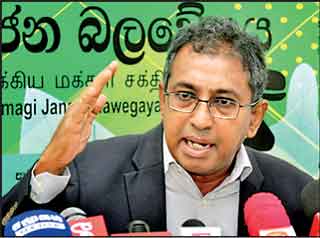Tuesday Feb 17, 2026
Tuesday Feb 17, 2026
Thursday, 27 July 2023 00:40 - - {{hitsCtrl.values.hits}}
 |
| SJB MP Eran Wickramaratne |
 |
| SJB MP Dr. Harsha de Silva |
By Darshana Abayasingha
The main opposition, Samagi Jana Balawegaya (SJB), yesterday called for a mind-set change to unleash a wave of growth for Sri Lanka to become a developed nation by 2048.
Sri Lanka could never achieve this target with its current growth rate and regulations, with 2023 still projected to deliver a negative rate of 3%, the party lamented. The country must put aside bankrupt policies espoused in the past and charter a new course, the SJB economic council said.
Addressing a media briefing in Colombo yesterday, SJB MP, Eran Wickramaratne, pointed to falsity amongst some members in parliament, pointing to the parliamentary report on expanding higher education in the country. He noted that an all-party committee had consulted with experts, including all state universities and registered education institutions including unions, and drawn up a roadmap for expanding higher education in the country, but the NPP had in the end not placed their signature to the document.
“Whoever is a provider of education services, be it government or otherwise, must have a good roadmap in place and we must invite investments into education here. This is something we had lost out on for over three decades thanks to the actions of a small but vested group of people. As a result, hundreds of thousands of people lost the chance to obtain higher education. Only 40,000 get selected to university where 130,000 qualify. Is that fair? We destroyed higher education opportunities for hundreds of thousands of people because of the whims of this group. However, all parliamentarians send their children abroad for education, even those from the leftist parties. There must be equal opportunity for all children to receive higher education. The SJB stands for fairness and equal opportunity and treatment for all,” Wickramaratne stated.
The MP added his party believes Sri Lanka must focus on developing its Human Resources and the capacity of its people, and education is a key pillar of this process. He noted state expenditure on education was just 1.5% of GDP at present, and this must increase to 3%. “When we speak of such measures, there are those who say we are trying to sell education. What progress have we made? We must think of 2030 and not of 1975,” he said.
The SJB’s vision is for a social-market economy where everyone has equal opportunity to realise their dreams and obtain access to education and the benefits they deserve, Wickramaratne said. Government must be a good regulator in this process, and the recent parliamentary report discusses good methodology to achieve this with global standards that can prove attractive to reputed international institutes, he added.
MP, Dr. Harsha De Silva, who was also at the briefing pointed to the Southern Indian state of Tamil Nadu, which is growing at 14%, and questioned why Sri Lanka cannot grow at the same pace. He pointed out Tamil Nadu has now over 800 higher education institutes churning out graduates who are contributing immensely to the state and the country, and connecting India to the world.
“How is it that they can do that and we can’t? How many qualified students come out of Sri Lanka? We need to understand this gap and realise the challenges before us. Why can't we grow at least 7%, if Tamil Nadu can grow at 14%. We can be a developed country sooner if we can do more than 7%. We have to identify the gaps in our country and for that we need to shift mind-sets and go forward within a progressive social-market economy. Society as a whole must understand and accept what changes are required to achieve the desired growth outcomes,” De Silva stated.
To achieve this, De Silva said there must be a government with a mandate from the people, adding that post the aragalaya, the public has realised there needs to be some degree of intelligence at leadership to take this country forward that looks beyond mere slogans.
He noted that whilst some people opine the proposed bridge to India is a bad thing, the SJB doesn’t feel so. There are great opportunities in Southern India and there is so much Sri Lanka could gain from what is now known as the Detroit of South Asia due to the thriving automobile industry in Tamil Nadu. Sri Lanka must change the way it approaches trade policy and build positive ‘policy bridges’ to the world, he added.